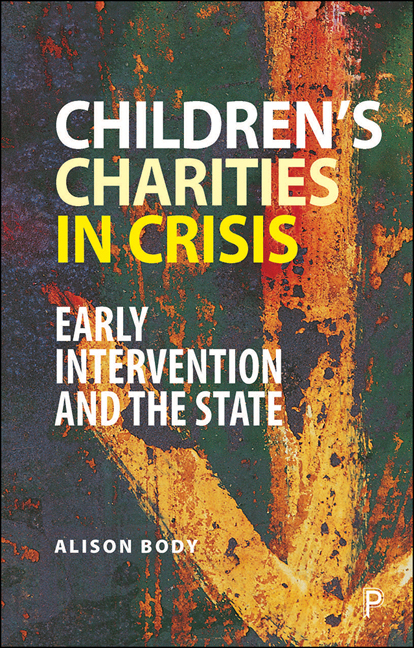Book contents
- Frontmatter
- Dedication
- Epigraph
- Contents
- List of Figures and Tables
- About the Author
- Acknowledgements
- Introduction
- Part I Preventative Services and Children’s Charities: Policy and Paradigm Shifts
- Part II On the Frontline of Early Intervention
- Part III The Lived Realities of Commissioning Children’s Early Intervention Services
- Part IV Concluding Thoughts
- Appendix: Data and Methods: Voices from the Frontline
- References
- Index
3 - The Policy and Service Delivery Field of Early Intervention Services
Published online by Cambridge University Press: 04 March 2021
- Frontmatter
- Dedication
- Epigraph
- Contents
- List of Figures and Tables
- About the Author
- Acknowledgements
- Introduction
- Part I Preventative Services and Children’s Charities: Policy and Paradigm Shifts
- Part II On the Frontline of Early Intervention
- Part III The Lived Realities of Commissioning Children’s Early Intervention Services
- Part IV Concluding Thoughts
- Appendix: Data and Methods: Voices from the Frontline
- References
- Index
Summary
In all honesty I am not sure what early intervention means any more, I change my definition of what it is depending on what meeting I am in. If I am with the local authority then broadly I am talking about Tier 3, intensive support services, if I’m in a team meeting at work, early intervention means helping whenever a child needs help. (CEO, medium children's charity)
Introduction
In this chapter we start by discussing what we mean by early intervention, and continue to go on to discuss how charities implement this in practice. Early intervention means both identifying and providing support to children and young people who are at risk of poor social, educational or physical outcomes. The concept is simple, tackle problems at the earliest opportunity to prevent them from escalating. This does not mean however that early intervention is always about the early years; rather, it is about recognising that problems can arise at any point in a child or young person's life and tackling them early helps prevent the problems from getting worse.
This, of course, all sounds great: the provision of early help to tackle problems head-on. However, according to the Early Intervention Foundation (2018), major issues are both persisting and getting worse. For example, they state that four million children were living in poverty in 2018, with the Institute for Fiscal Studies predicting that this would rise to five million by 2020 (Cribb et al, 2018); one third of children are overweight or obese; increasing numbers of children are experiencing mental health problems and youth violence is a pressing concern. A House of Commons report (Powell, 2019) highlighted the ongoing shift in support away from early intervention into costly late intervention services. Their survey across directors of children's services revealed that 89% found it increasingly challenging to fulfil their statutory duties. Indeed, in a report published to celebrate their 150th year, Action for Children (2019) highlight how across those 150 years, while there have been marked improvements in children's services, they also note that in the past decade, particularly since the financial crash in 2008, children's lives have seemingly got worse. Alongside noting increases in child poverty, there are more children than ever subject to a child protection plan and increasing numbers of children going into care.
- Type
- Chapter
- Information
- Children's Charities in CrisisEarly Intervention and the State, pp. 63 - 80Publisher: Bristol University PressPrint publication year: 2020



